|
Your set list is essential to your short and long term musical and financial goals.
Dirty Little Secret #1: it is not YOUR set list; it’s the audience’s set list as well as the club owner’s set list. In our wedding band, all anyone had to say was “Tune selection . . .” and everyone would respond with “is crucial”. You can win over a room of people with the right song at the right time just as easily as you can lose them with wrong song. On a typical three-hour gig, I’ll go through approximately 45 songs. That means the set list I have designed for the gig will easily have 150 songs in it. I always over-prepare. My set list is designed for the clientele that I will be expecting at the gig as well as the expectations of the club owner. It has NOTHING to do with songs that I feel like playing. I am always modifying the set list in real time to accurately reflect the BEST songs I can do in the moment dependent on who is listening to me. I play in a wide variety of venues and that is reflected in my set lists. As a result, the set lists I design for venue#1, venue #2, and venue #3 will often contain NO overlap in tunes. That means I need to know and be able to access 450 tunes on a second’s notice. Knowing and acknowledging the vibe of the venue is important when developing a set list. A set list has to accommodate spontaneous requests from the club owner as well as the customers. For example, the first time I played at an Italian restaurant in lower Delaware, the manager had light instrumental opera playing in the background as I was loading in – that was a first for me! Staying with the vibe, I added intros and outros to some of my songs that were based on light classics: “Girl With the Flaxen Hair”, “Clair de Lune”, "Nessun dorma", “Moonlight Sonata”, Chopin's Prelude in Em, Op. 28 #4. Every time I played one, I got a big smile from Marco, the manager. At one point, he came up and in his thick Italian accent, said, “Your piano sounds fantastic! You gotta play my favorite classic – but I forget the name!” I ran through the opening bits from some Mozart, Beethoven, and Mendelsohn but none of them was the one he wanted to hear. Eventually, he said, “You GOTTA know it, it’s a CLASSIC! It starts . . . “ and then he breaks into full-throated song. “Don’t go changin’!” At that moment, I realized that he was correct. Billy Joel’s “Just the Way You Are” is a classic! I started the intro and immediately Marco started dancing table to table and singing to his customers. Everyone smiled and raised a glass of wine, saluting him as he came by. It was a moment, a moment we repeated every time I played at his restaurant. Picking the right songs and creating the best set list you can is part of a musician’s win/win mindset. Sure, it requires that you learn a lot of material – but in the long run, it’s worth it! I sometimes see social media posts where gigging musicians bemoan what club owners pay.
There are a few variables here. Why are you gigging? For a hobby? For fun? For money? For ego gratification? Equal parts of several options? If you are financially comfortable and just gigging for shiggles and giggles, go for it! Don’t worry about the fee and stop reading right here. If any part of the reason that you’re gigging is for money, are you OK with what you are getting paid? Is gigging fulfilling short or long term financial goals? And no matter what, don’t let your mental axle get wrapped around money, either the money you are paid or that you are tipped. Never use money as a measuring tool for you own musical worth. Try to see everything as the tip jar being half full and not half empty! Gigging is fundamentally about entertaining – don’t let it take on the characteristics of a “cry for help” or an excuse for financial failure. Is gigging your “business”, your “job”, or both and how does it function in your budget? As I have mentioned in other posts, for decades, my finances have been bifurcated: job money and business money. And “gigging” for me encompasses “business” revenue streams including solo gigs, a wedding band, sideman gigs, composer in residence, private teaching, collegiate teaching, designing music/educational software, investing, composing for TV and film, recording, and consulting. I was generating a ton of music and for many years not sleeping a lot! Everyone does this differently. This is how I approached it. In My 40s Before I could put that job money and business money plan into action, I had a lot of credit card debt to pay off and a terrible credit rating. When I got divorced, I assumed all the outstanding debt and it was a lot. For three years, with the exception of my IRA and Roth IRA and a small emergency account I maintained, the goal was to pay off the debt with every penny I could apply to the balance. Everything I bought was paid in cash. These were very lean years. I worked with a financial planner who helped me plot what I would earn through my job and business for every five years until my retirement goal date. With the exception of events of 2001 and 2008, it was pretty accurate. I had something to aim for. I became acutely aware that it is impossible to hit a target if you don’t know what or where the target is. The “job” (public school teacher) was what I did for 7.5 hours five a days a week with a static salary but my “business” was what I did for 16.5 hours five a days a week and 48 hours on weekends and the sky was the limit. I could be a productive or lazy as I wanted to be! I learned how to turn those 16.5 business hours to pay down my debt. I took every opportunity to work and dissolve those revolving charge accounts. No pay check was too small and was always big enough to necessitate a thank you note to the person who hired me. After a few years, I cleared all my debt off the books. I continued hustling and forcing myself to pay my day-to-day out of my business money. If I didn’t make that much during those 130.5 hours every week, guess what - I had to cut back that week, usually on food or leisure. Boiling old bass strings, ramen noodles, three-day-old pizza at the shop down the street, and milk that was less than “fresh” equated to a deeper level of fiscal self-discipline I didn’t realized I possessed. I invested the money from the 38.5 hour a week job in my business. My business was my compounding long-term economic plan. I invested money from my business to help finance my day job master’s degree. After I got the degree, I got a hefty raise in my job. I paid my business back the money I borrowed. I bought a house! I was taking and negotiating increasingly more lucrative solo and wedding band gigs and doing less sideman work where the compensation was static. It meant more work and planning that was not technically related to making sounds on an instrument – contracts, client and venue interaction, always trying to perfect the best set list for gigs, hiring sidemen, etc. but it allowed me to retain more of the fruit of my labors. In My 50s I became more particular with how I booked my business hours. I didn’t take every gig that came down the pike and was still able to max out my IRA and Roth IRA. My job, business, and investment began to gain momentum and take off. The small gigs and the small pay checks (as well as the large ones) I had invested in my early forties had compounded many times over by the end of my fifties. In My 60s I was able to retire from my job at 66 and truly enjoy my retirement totally DEBT FREE. I kept the business going. During covid, I was offered a long term teaching position for a sizable amount. I made a counter offer that was twice as large. They came back with an offer that was $7,000 under my offer. I came back with my original offer. They refused to budge off their second offer. I walked away. And walking away is an acquired skill. It’s acquired by developing a solid financial business plan that results in total financial independence. If You Are Playing Gigs for the Money My way is not the only way – everybody needs to come up with their own plan. The sooner you design, start, and stick to your plan, the happier you’ll be in the long run. A couple of suggestions when looking at the money that club owners are willing to pay: If gigging is not your 7.5 job but rather your 16.5 business . . .
If you find yourself complaining about gig money, find yourself another musician you respect who you can talk to and listen to your feelings. You might have noticed I never said what a good fee for a gig is. That is up to you. If you are happy with the money, you will be happy with the money. If you feel that you are not getting paid enough, that is how you will feel. PLEASE don’t equate what you get paid with self-worth – because it probably won’t work out in your favor. And in the end, it’s not about what you get paid. It’s about what how much of what you get paid is invested and is continuously compounded. Your material music investment should not be based on vanity of any kind. If my material investments didn't return at least a 75% return in two years, I did without and didn't put the money there - no CDs, no videos, no overpriced promotional material. For example, I have designed all my own business cards and stationary over the years. If after decades of gigging, you are able to positively approach your time gigging as an effective way of fulfilling artistic as well as financial goals, you should be debt free or at least close to debt free. By doing the financial and musical homework, you will have had a great career, created a strong business, made life-long friends, played fun gigs, and generated a ton of great memories to look back on. Plus you’ll know a hell of a lot of songs! Music is a personal journey.
As a teacher, you’ve already started your trip and are only a tour guide for trip that your students are embarking upon. You’ve picked your destination. Grant your students some autonomy by allowing them to pick their own destination. Remember, you’re driving the tour bus – so you control the route they will take 7.5 hours a day. You plan the itinerary with your long and short range lesson planning. Keep a balance in your lessons between what your young travelers want, enjoy, and pursue with the basic skills and knowledge you know will help them arrive at their current destination. There will be bumps in the road – and you know where many of them are from your own personal journeys. Just like any traveler, your students might get tired, frustrated, and uncomfortable along the way – primarily because they have never experienced what is up ahead on the road. You’ve traveled the musical road. Don’t let them over pack. You only have so much time to travel and loading every bit of musical knowledge you possess into their suitcase will make for a labor-intensive trip for them. Esoteric knowledge and deeper theoretical understandings can wait for another day. Focus on what will make music today and the near future. Have them bring the essentials. Give your kids the opportunity to take an occasional break, relax, while still reminding them of the exciting sights and scenes waiting for them around the next corner. And take pictures along the way and revisit the memories. Sing old songs, do activities that they’ve enjoyed doing a million times but still want to do them “one more time”. And remember, as the tour guide, you are expected to do all of this with a smile on your face. Have fun. |
AuthorBoyd Holmes, the Writer Archives
June 2025
Categories |
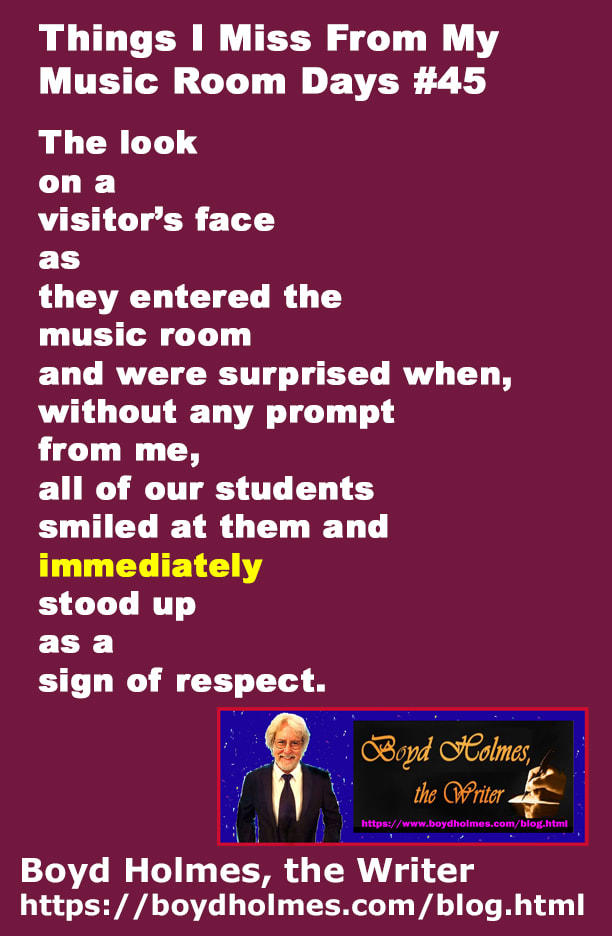
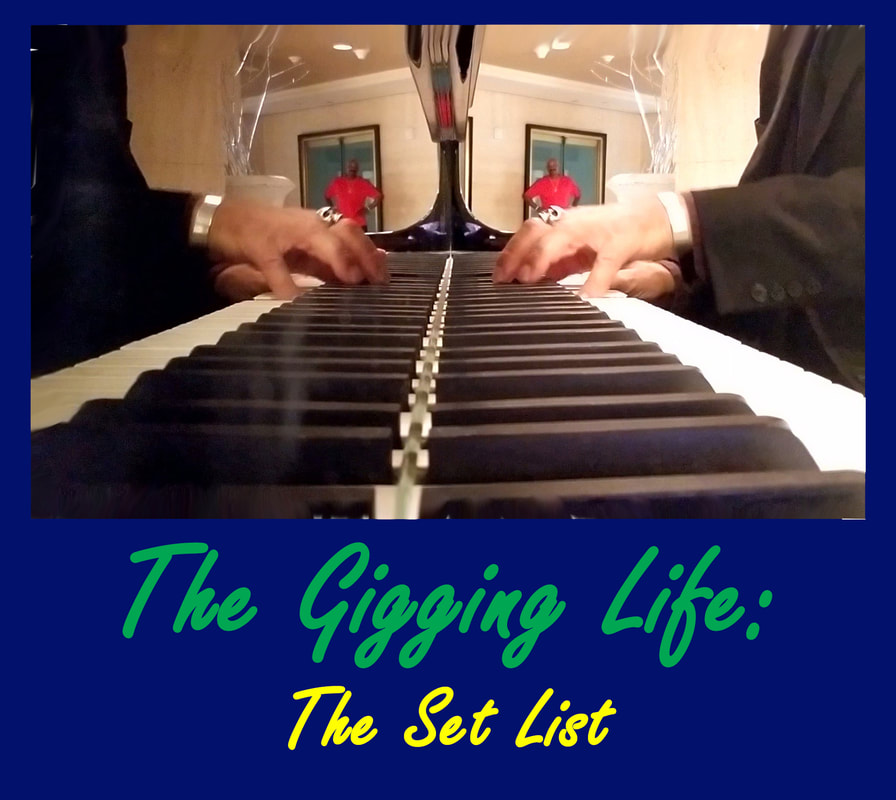
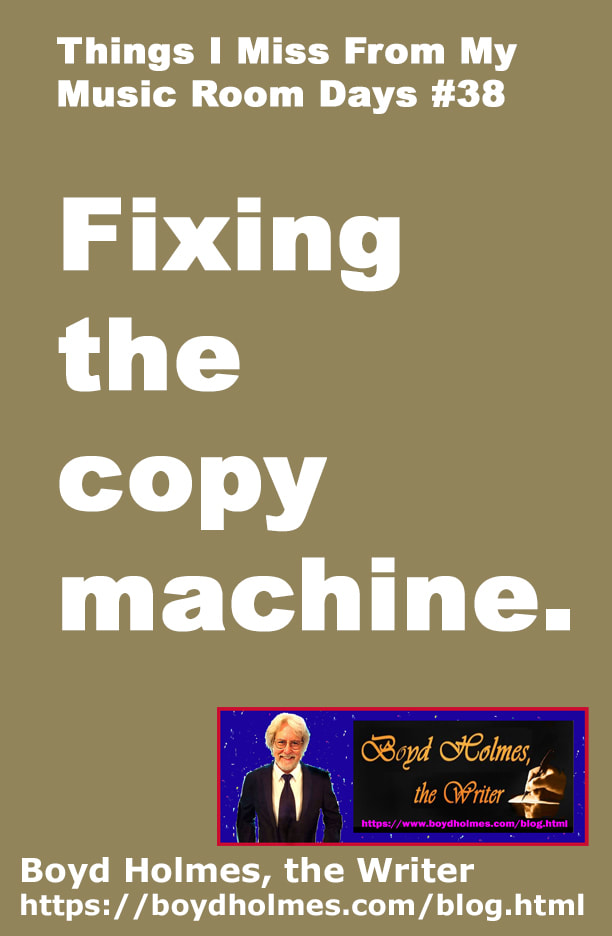
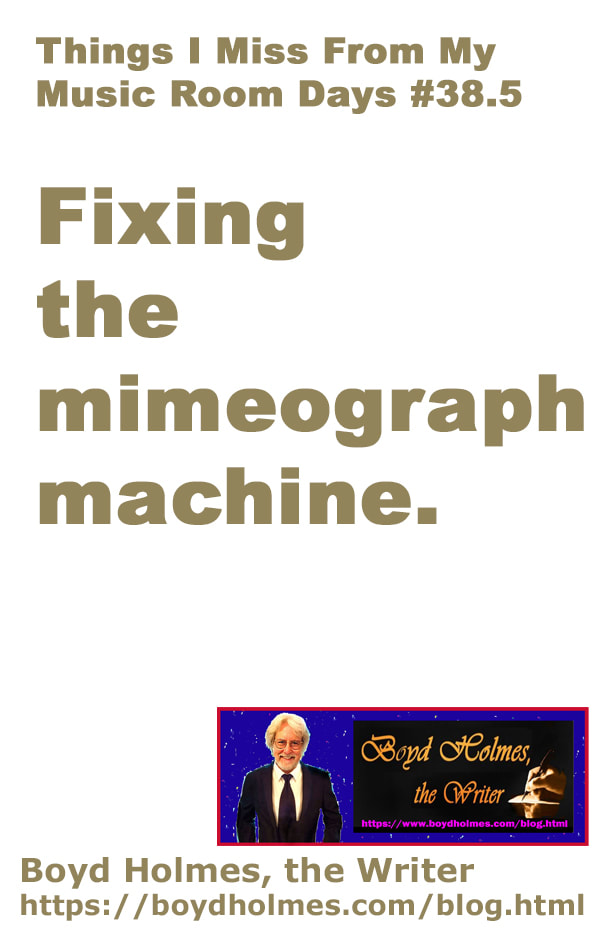
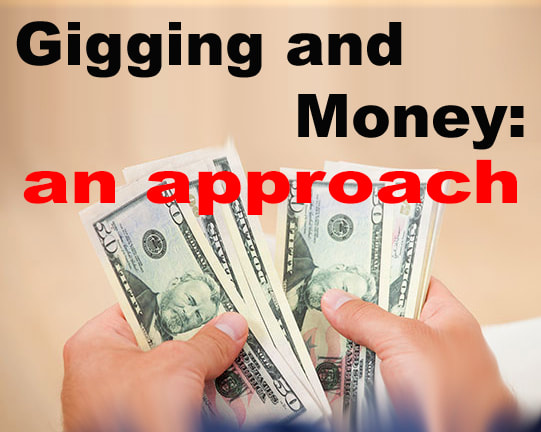
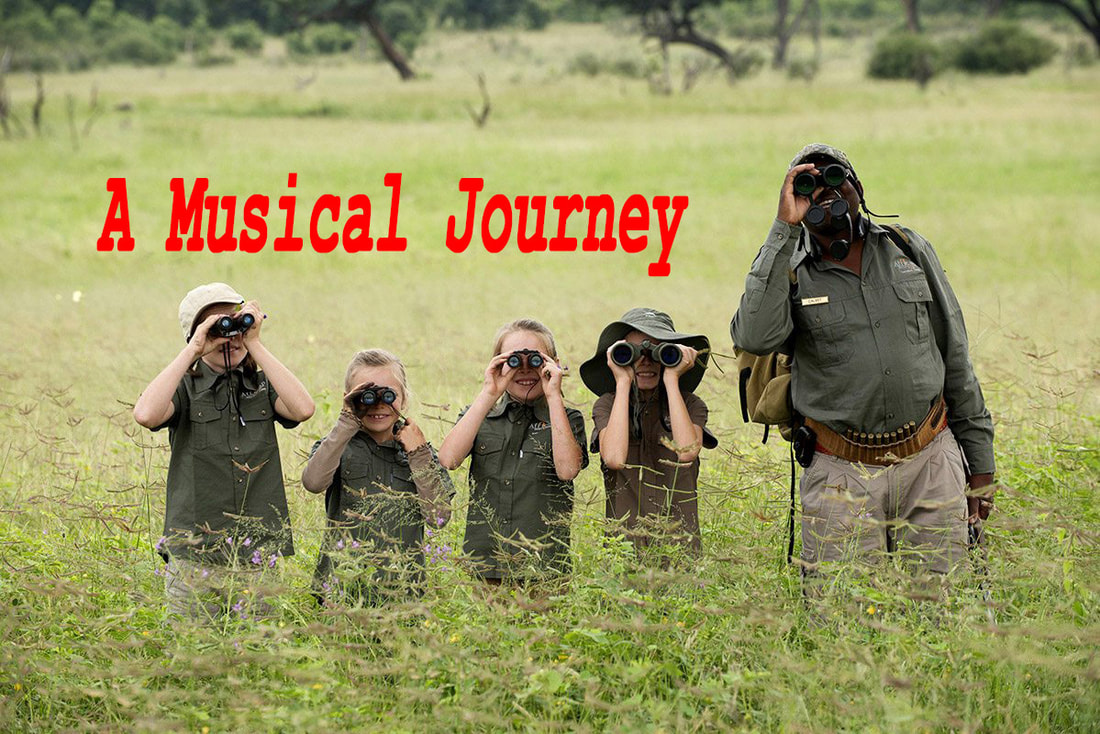
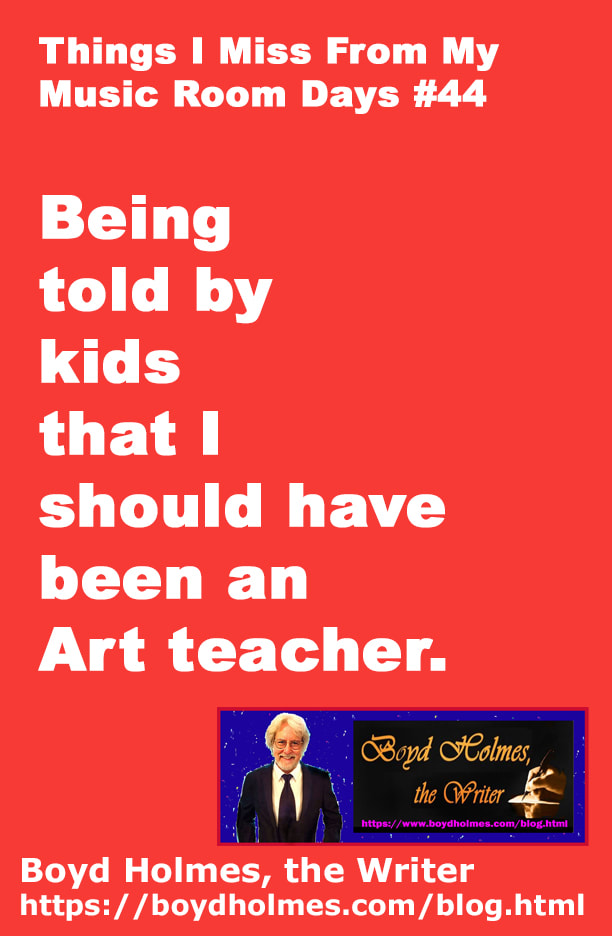
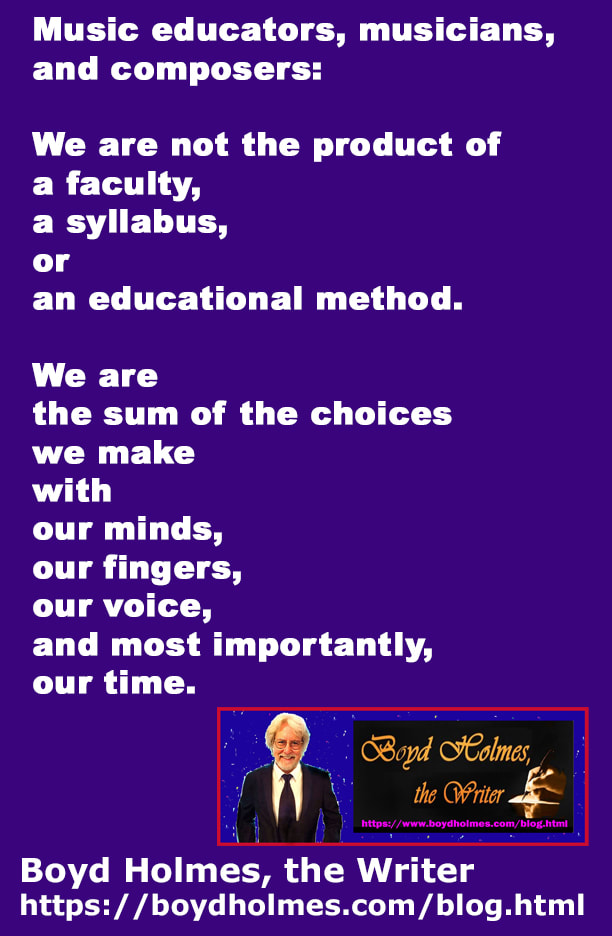
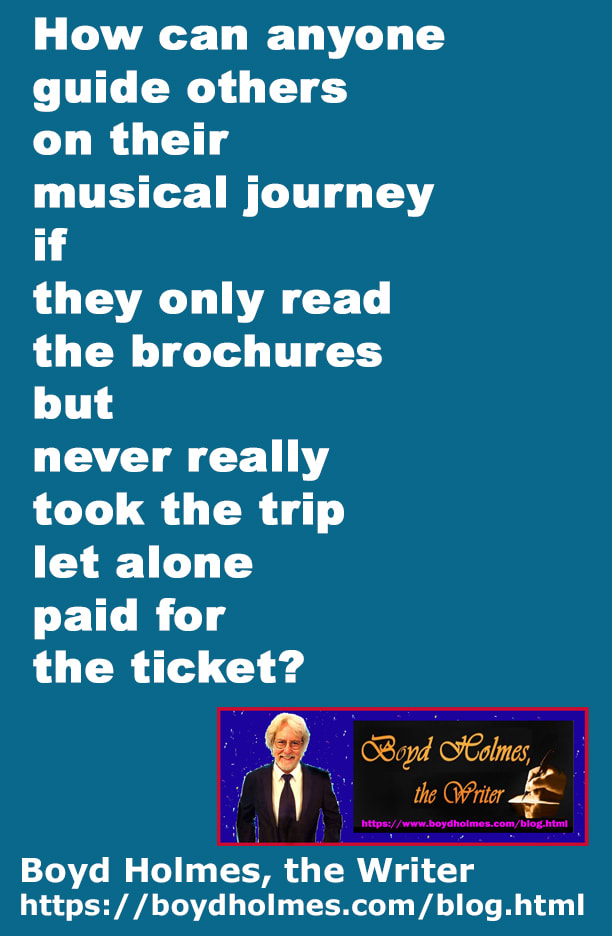
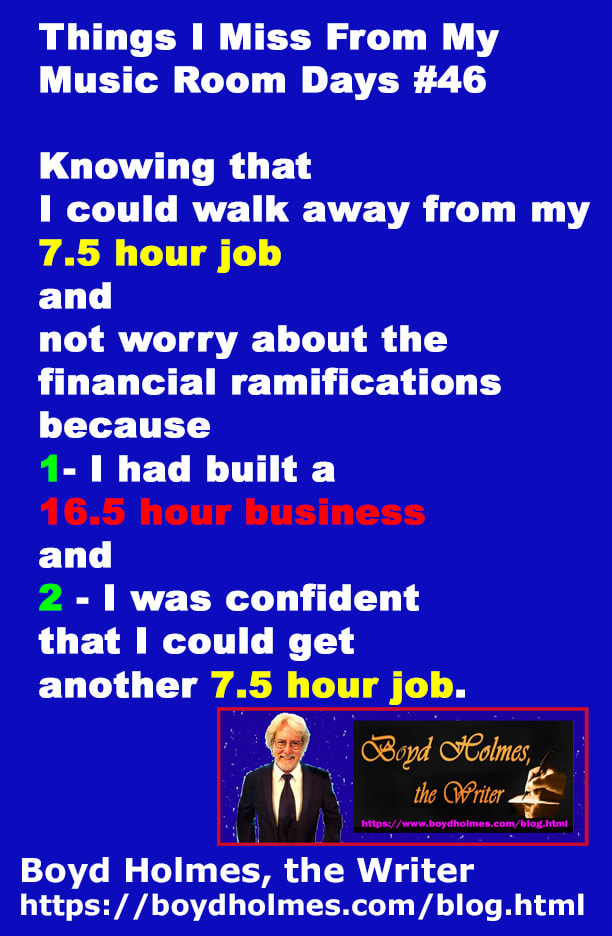
 RSS Feed
RSS Feed